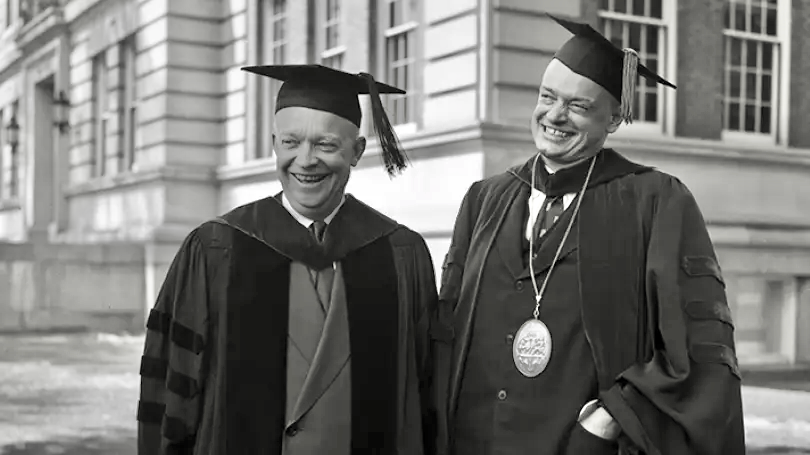
Commencement serves as the capstone of graduating seniors’ collegiate years and marks a celebratory moment of intrinsic consequence. However, for better or worse the actual memorability of a commencement ceremony has long been defined by the address or addresses delivered. Numerous speeches are made at each Commencement as a matter of routine, inclusive of the presidential address, a valedictory address, an invocation, and of course that of the specially recruited “commencement speaker.” Dartmouth seems to have a particular penchant for enlisting alumni to fill this latter spot, as it has for this year’s Commencement, at which the filmmakers Chris Miller ’97 and Phil Lord ’97 are slated to speak.
While I am sure that theirs will be an engaging talk, I sincerely doubt that any remarks of particular notability shall be tendered. I am not one to deny that the celebrities who so often speak at commencements can in fact impart at least some degree of wisdom or advice, particularly of the more practical kind. However, commencement speeches in the aggregate simply do not lend themselves to the issuance of era-defining commentary.
Perhaps the most notable exception to this rule occurred seventy years ago, at Dartmouth no less, in what remains the most nationally significant address ever delivered at a Dartmouth Commencement and possibly in the history of the College. Critically, the address and its sagacity remain extraordinarily relevant today.
U.S. President Dwight D. Eisenhower, at the time only five months in office, attended Commencement in June 1953 to receive an honorary doctorate and deliver well wishes to Dartmouth’s graduating class. Eisenhower’s presence likely stemmed from the fact that he and then-Dartmouth President John Sloan Dickey knew each other well. Dickey had been a high-ranking member of the State Department during the Second World War, and his tenure as president of Dartmouth overlapped substantially with that of Eisenhower at Columbia.
After an introduction by Dickey, Eisenhower was expected to deliver brief remarks in which he would thank Dartmouth for the honorary doctorate and pay tribute to the Class of 1953. However, his impromptu address proved to be infinitely more substantive. Encouraged by a fellow speaker and guided by his own sense of moral rights and wrongs, Eisenhower took the opportunity of his address to extemporaneously criticize, for the first time publicly, the abuses of the powerful U.S. Senator Joseph McCarthy and his allies. In so doing, Eisenhower also proffered an impassioned valorization of free speech as fundamental to the nation.
In his 10-minute address, Eisenhower first counseled the new graduates to set high personal standards and pursue them and to derive joy from helping to make the world a better place. He then urged the graduates to view the world and themselves with “honest eyes.” Along these lines, in words that made international news, he declared:
Don’t join the book burners. Don’t think you are going to conceal faults by concealing evidence that they ever existed. Don’t be afraid to go in your library and read every book, as long as that document does not offend our own ideas of decency. That should be the only censorship.
How will we defeat communism unless we know what it is and what it teaches? And why does it have such an appeal for men? Why are so many people swearing allegiance to it? It is almost a religion, albeit one of the nether regions.
And we have got to fight it with something better, not try to conceal the thinking of our own people. They are part of America. And even if they think ideas that are contrary to ours, their right to say them, their right to record them, and their right to have them at places where they are accessible to others is unquestioned, or it isn’t America.
These words which Eisenhower delivered without preparation, much less consultation with political advisors, sent a clear message to the nation and the world: He and his administration would oppose McCarthy and protect the free speech even of those with whom Americans tended to categorically disagree.
To my mind, it is appropriate that Eisenhower delivered these words, about how fundamentally American it is to support free speech, at such an historic college, insofar as the historical mission of American educational institutions is to live up to that very ideal.
Today, Dartmouth needs to be reminded of Eisenhower’s words and should be honored that it was here, seventy years ago, that he gave this pronouncement, which remains eminently applicable—even closer to home. Increasingly, ours is an era in which views of the minority on campus are all too readily subdued and discouraged. The College would do well to consider itself especially obligated to fulfill Eisenhower’s charge.
Indeed, as much as this year’s Commencement shall mark the end of an era, so too will it signal the start of a new chapter in Dartmouth’s history. As President Hanlon bids us farewell, I hope that President Beilock in particular may take Eisenhower’s declaration as instructive. She has spoken in support of freedom of speech, and I hope that Eisenhower’s timeless message of values is the standard that her administration will embrace.

Be the first to comment on "Editorial: On Commencement and Free Speech"